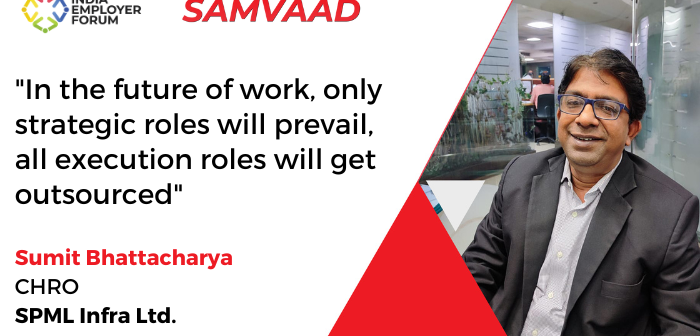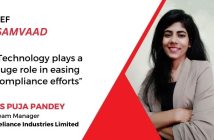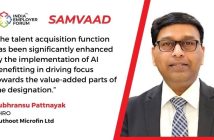Sumit Bhattacharya, CHRO, SPML Infra Ltd. (Subhash Projects & Marketing Limited) talks to India Employer Forum about the hurdles in the HR function in the new world of work, use of HR Technology, buzz around quiet quitting and moonlighting, and the future of work.
Q. Tell us a little about yourself.
I’m Sumit Bhattacharya. I have a master’s degree as well as 24 other qualifications from different foreign universities. I have studied Talent Management courses from XLRI. I’m currently working with SPML Infra Ltd., which is one of the largest Engineering Procurement and Construction companies as Group CHRO. I have a total of 25 years of experience in HR. I’m into strategic HR, focusing on talent management learning & OD and psychometric assessments. During my leisure time, teaching is my passion, so I teach the foreing university students online.
Q. What is the biggest hurdle for the HR function in the new world of work which has evolved over the past few years?
The biggest hurdle so far in my experience is talent management, especially talent engagement and total reward. Talent engagement does not mean that I am organising a picnic or a birthday celebration. Talent are those individuals whose knowledge and skill abilities are not easily available in the market. So, in order to retain them, the total reward system is imperative, and that is the biggest hurdle. Rewards are primarily of two types, transactional reward, one which can easily be monetised and the other is the relational reward, which cannot be easily monetised. Those include training and development opportunities that the company can provide.
Q. What are your views on HR Technology and its use in optimising human capital and countering new buzzwords like quiet quitting?
HR technology is most important in today’s age. I believe all the processes in HR should be automated. In our organisation, from hire to retire, everything is completely automated. HR automation or HR technology has to be there from the entire life cycle of the organisation, with special emphasis on upskilling, because the era of traditional Learning and Development is now over. The largest method or the popular method for upskilling is peer group learning, which can be done through automation, where e-learning can become a vital part. Now, there are two things where HR automation can increase productivity, one is in upskilling and after that, KPI identification and monitoring, competency mapping and measuring the performance.
Now, when it comes to quiet quitting, it depends on how your relational rewards are designed and how you are able to engage with your employees, building relationships basically through emotional intelligence. So, we can minimise quite quitting through technology, but we cannot completely bring it down to zero.
Q. With the uncertainty in the global economy and recession fears looming about, what do you think are the most important aspects in preparing for such an event if it occurs?
We have all seen uncertainty during COVID. It was a big lesson for us, and the best way to deal with it is to create the opportunity without firing. Firing is not at all an option since it has a very bad impact on the market. So, if we create diversification business and create opportunities, it can help employees. We have made it happen actually. There are other group companies where if someone is not fitting in a particular role, we place them in other subsidiary companies.
Q. What are your views on the future of work in the coming years, and how do you visualise it?
In the future, there will be smaller organisations, smaller setup without any need to have big costs and less hierarchy, with more emphasis on employee wellness and wellbeing. Also, in the future, only the strategic role will prevail and all the execution roles will get outsourced. I can also visualise robot assistance and smarter brainstorming, where lesser groups, greater ideas with better implementation. So, that is how I am looking at the future with regard to my previous 25 years of experience.
Watch the full interview: In Conversation with Sumit Bhattacharya | CHRO | SPML Infra Ltd
About Sumit Bhattacharya
Having more than 25 years of experience in HR Domain, Sumit has worked in 4 Countries in different industries like Manufacturing, Retail, IT, Education, Financial Services, NBFCs and EPC and Infrastructure Sector. He counts Astralsys (US), International Group (UK), Khadims, Microsec, Srei Group and Propello Group as his previous experiences. Apart from his MBA and being an XLRI Alumni, he also earned 24 qualifications in different fields of HR from various Foreign Universities. He is specialised in Talent Development, Organisational Development, Competency Mapping and Psychometric Assessments. Currently, he is associated with SPML Infra Ltd. as Chief Human Resources Officer and its other Group Companies. Sumit is very passionate in teaching and training and is associated with many Foreign Universities as a Guest Lecturer, Certified Trainer and Coach.




